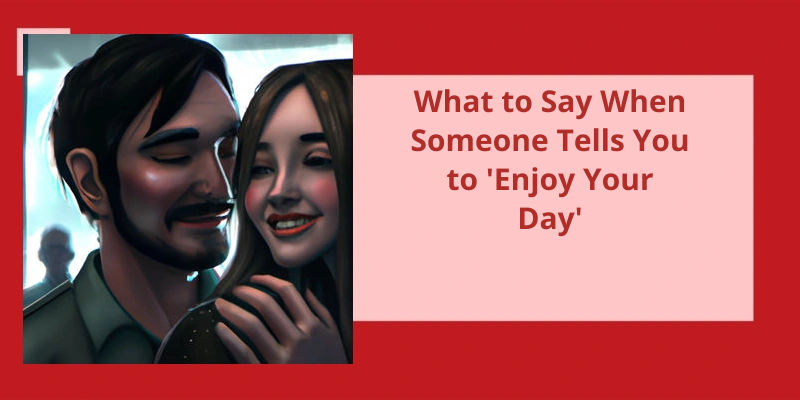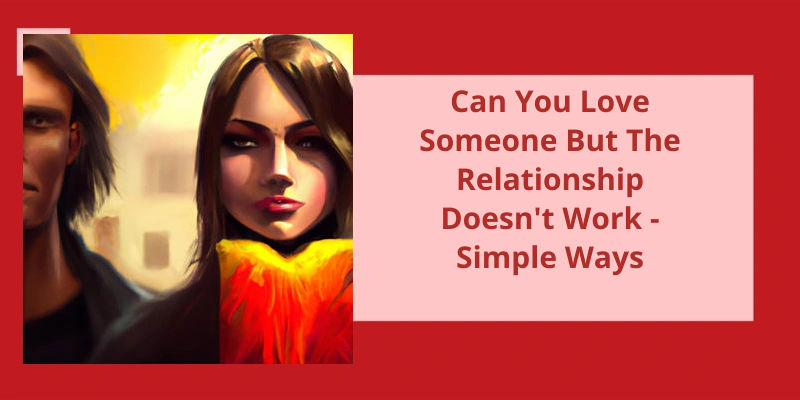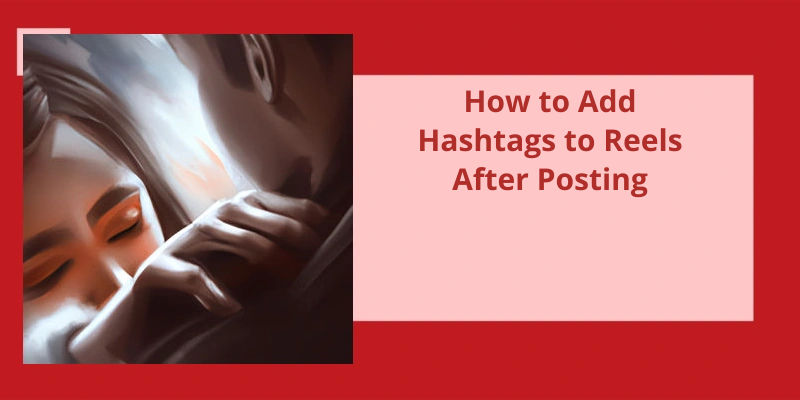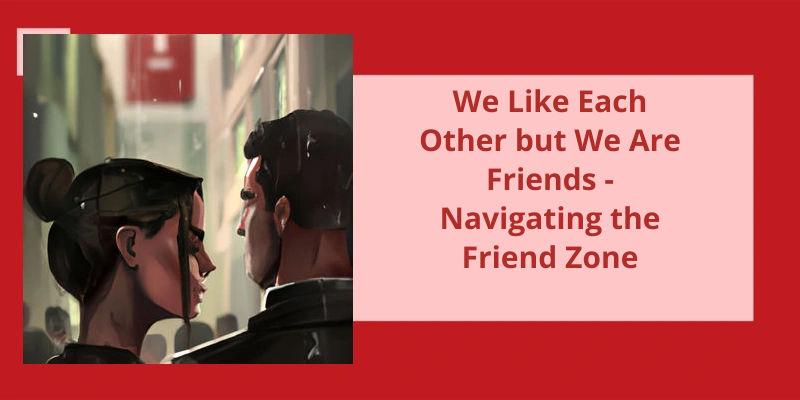Human interactions are complex and often involve specific language codes that signal politeness and mutual respect. One of these codes involves the phrase "Enjoy your day," which can be used as a farewell or a simple wish for a pleasant day. However, knowing how to reply to this phrase can be tricky, as various factors can influence the response's appropriateness and effectiveness. For instance, replies that seem too generic or insincere can backfire and create negative impressions, while replies that are too casual or personal can breach social boundaries and invade people's privacy. This article will explore the various options for replying to "Enjoy your day" and provide tips for making the exchange authentic, respectful, and positive.
Do You Say Thank You When Someone Says Enjoy?
However, it’s not always necessary to say thank you when someone says enjoy. Sometimes, the person saying enjoy isn’t looking for a response or acknowledgement from the other person. In these situations, saying thank you may come across as insincere or unnecessary. Instead, it’s better to simply smile or nod in acknowledgement of the persons words.
Another factor to consider is the level of familiarity between the two people. However, if it’s someone you don’t know well or a formal setting, saying thank you is the polite thing to do.
As a general rule, it’s good to show appreciation for kind words and gestures from others. However, in some cases, it may be better to simply acknowledge the sentiment and move on without an overt response.
Do You Say Thank You When Someone Says Have a Good Day?
However, saying thank you isn’t always necessary. If the person is simply a cashier or service worker who’s repeating a standard farewell, such as “Have a nice day,” it isn’t necessary to say thank you. Simply responding with a friendly “You too!” is sufficient.
It’s important to remember that showing appreciation and kindness towards others is always a good practice. If someone does something nice for you, whether it be a stranger holding open a door or a co-worker helping you with a task, taking a moment to say thank you can make both you and the other person feel good.
Saying thank you isn’t just a polite gesture, it can also strengthen relationships and build connections. When someone goes out of their way to do something for you, expressing gratitude can show them that you value their efforts and can inspire them to continue to help you in the future.
In some cultures, saying thank you for certain actions may not be expected or even normal. It’s important to be aware of cultural norms and practices, and to adjust your behavior accordingly.
In summary, saying thank you when someone says “Have a good day!” is a polite and appreciated gesture. It isn’t always necessary, but showing gratitude towards others can strengthen relationships and build connections. When in doubt, taking a moment to express appreciation is always a good practice.
The Importance of Expressing Gratitude in Different Situations
Expressing gratitude is essential in various situations as it acknowledges the efforts of others and motivates them to keep up the good work. It makes people feel valued and appreciated and leads to stronger relationships. Thanking someone also creates a positive attitude and reduces stress and anxiety in both the giver and receiver.
When expressing a positive sentiment to someone, it’s important to have a diverse vocabulary to avoid sounding repetitive. One such sentiment that we often convey is “enjoy.” However, there are many synonyms for this word that can add variety and depth to our messages. Some of these synonyms include “appreciate,” “like,” “love,” “relish,” “revel in,” “savor,” “adore,” and “dig.” Let’s explore each of these synonyms and how they can be used in different contexts.
How Do You Say Enjoy to Someone?
When you want to express to someone that you hope they’ve a good time or that you want them to take pleasure in something, there are many ways to say it without being repetitive. A common option is to use the word “enjoy,” which can be paired with a variety of other words to add some variation and specificity to your message. For example, you might say “enjoy your meal” to someone sitting down to eat, or “enjoy your vacation” to a friend who’s about to embark on a trip.
However, if you want to avoid using the word “enjoy” too much, there are many other synonyms you could use instead. One option is “appreciate,” which suggests that you value and respect the thing the person is about to experience. For instance, you might say “I appreciate the effort you put into this gift” or “I really appreciate your hard work on this project.”
Another option is “like,” which is a more casual way of expressing a positive sentiment. If you say “I like your outfit” or “I like the way you decorated that room,” it suggests that you think the thing they”ve done is enjoyable, but not necessarily life-changing.
If you want to convey a stronger emotion, the word “love” might be appropriate. This word suggests a deep affection or fondness for something, whether it’s a person, an activity, or a thing. For example, you might say “I love this book” or “I love spending time with you.”
Other synonyms for “enjoy” include “relish,” which means to savor or take great pleasure in something; “revel in,” which suggests a kind of joyful abandon or celebration; “savor,” which means to fully appreciate and enjoy every moment of something; “adore,” which implies a strong fondness or adulation for something or someone; and “dig,” which is a more slangy way to say you really enjoy something. Using these words can help you express positive feelings without repeating the same phrase over and over again.
As humans, we often seek enjoyment in life. It could be enjoying a nice meal, spending time with loved ones, or taking part in an activity we love. But what does it really mean when we say we “enjoy” something? It’s a simple word, yet it holds a powerful meaning. In this article, we delve deeper into the concept of enjoyment and explore it’s various aspects.
What Does It Mean When Someone Says Enjoy?
When we communicate with one another, language plays a vital role in conveying meaning and intent. Words can be loaded with layers of cultural context and personal interpretation, often requiring contextualization to be properly understood. One such word that’s frequently used but not always well understood is “enjoy.”. When someone says, “enjoy,” theyre typically expressing the hope or expectation that the listener will derive pleasure or satisfaction from a particular experience.
It’s a way of encouraging someone to embrace and appreciate the experience ahead of them, to savor the moment and make the most of it.
Is the speaker expressing a genuine hope that the listener will have a good time, or are they making a polite but detached social gesture? Are they expressing their own enjoyment of the experience, or merely acknowledging it’s potential enjoyment value? These nuances can have a significant impact on how the listener interprets and responds to the word “enjoy.”
But enjoyment is a complex and multi-faceted emotion that can be influenced by a variety of factors, including individual preferences, past experiences, and cultural norms. For example, a person who grew up in a strict religious community might not find the same things enjoyable as someone who was raised in a more permissive environment.
By expressing the desire for someone to “enjoy” an experience, weren’t only acknowledging the potential pleasure of the moment but also encouraging them to find meaning and joy in their lives more broadly. This is why “enjoy” has become such a ubiquitous and popular phrase – it’s a simple yet powerful way of connecting with others and celebrating the good things in life.
Despite it’s ubiquity, however, it’s important to approach it with an awareness of context and individual differences.
Now that we’ve addressed the etiquette of responding to someone who wishes you a pleasant day, let’s shift our focus to other common social scenarios that may require a bit of politeness and tact.
Do You Say Thank You When Someone Says Enjoy Your Day?
Saying “enjoy your day” is a polite gesture, intended to show that you care about the persons well-being and want them to have a good experience. It’s a small but significant way to make someone feel appreciated and valued. Likewise, responding with a simple “thank you” is a courteous and appropriate way to acknowledge the sentiment.
Some people might feel inclined to go further and elaborate on their plans for the day, but this isn’t strictly necessary. It can sometimes come across as disingenuous or forced, especially if you don’t really have anything interesting or exciting to share. It’s better to keep it simple and avoid making a big deal out of it.
That being said, there are certainly instances where a more elaborate response might be appropriate. For example, if youre going on a vacation or doing something particularly noteworthy, it might be appropriate to share a bit more about your plans. But even in these cases, it’s important to keep in mind that the other person is only expressing a general sentiment, not necessarily asking for a detailed rundown of your itinerary.
Ultimately, the most important thing is to be genuine and sincere in your interactions with others. If someone says “enjoy your day”, it’s perfectly acceptable to respond with a heartfelt “thank you” and leave it at that. If theres more to share, you can certainly do so, but don’t feel like you’ve to go out of your way to impress or entertain others. Just be yourself, and let your actions speak for themselves.
Source: How to reply back to someone who says “enjoy your day on …
Conclusion
In conclusion, responding to someone who tells you to enjoy your day requires some degree of social etiquette. Saying "Thanks, you too!" not only conveys your appreciation for their goodwill but also expresses your desire for them to have a great day too. Remember that small gestures of common courtesy can significantly impact how others perceive you, and by responding politely, you not only enhance your image but also promote positive interactions with those around you.






